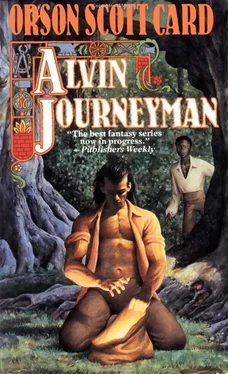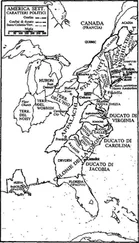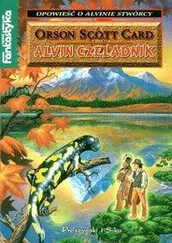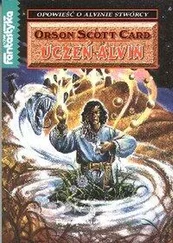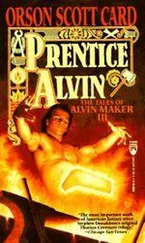Orson Card - ALVIN JOURNEYMAN
Здесь есть возможность читать онлайн «Orson Card - ALVIN JOURNEYMAN» весь текст электронной книги совершенно бесплатно (целиком полную версию без сокращений). В некоторых случаях можно слушать аудио, скачать через торрент в формате fb2 и присутствует краткое содержание. Жанр: Фантастика и фэнтези, на английском языке. Описание произведения, (предисловие) а так же отзывы посетителей доступны на портале библиотеки ЛибКат.
- Название:ALVIN JOURNEYMAN
- Автор:
- Жанр:
- Год:неизвестен
- ISBN:нет данных
- Рейтинг книги:3 / 5. Голосов: 1
-
Избранное:Добавить в избранное
- Отзывы:
-
Ваша оценка:
- 60
- 1
- 2
- 3
- 4
- 5
ALVIN JOURNEYMAN: краткое содержание, описание и аннотация
Предлагаем к чтению аннотацию, описание, краткое содержание или предисловие (зависит от того, что написал сам автор книги «ALVIN JOURNEYMAN»). Если вы не нашли необходимую информацию о книге — напишите в комментариях, мы постараемся отыскать её.
ALVIN JOURNEYMAN — читать онлайн бесплатно полную книгу (весь текст) целиком
Ниже представлен текст книги, разбитый по страницам. Система сохранения места последней прочитанной страницы, позволяет с удобством читать онлайн бесплатно книгу «ALVIN JOURNEYMAN», без необходимости каждый раз заново искать на чём Вы остановились. Поставьте закладку, и сможете в любой момент перейти на страницу, на которой закончили чтение.
Интервал:
Закладка:
The judge turned to the Finders. "Well, now. I wonder how it happens that you appointed for slavery these two freeborn Black children."
One of them spoke up immediately. "Your Honor, I will protest this whole procedure. We were not brought here to be placed on trial ourselves, we were brought here to practice our profession and—"
The gavel slammed down on the desk. "You were brought here to practice your profession, that is true. Your profession requires that when you make an identification, it must be assumed by all courts of law to be both honest and accurate. Whenever you practice your profession, here or in the field, your license is on the line, and you know it. Now, tell me at once, did you lie when you identified these boys, or were you merely mistaken?"
"What if we was just guessing?" one of them asked. Verily almost laughed out loud.
"Guessing, in this context, would be lying, since you were swearing that the boy you named was a match for the cachet, and if you had to guess, then he was not a match. Did you guess?"
The man thought about it for a moment. "No sir, I didn't lie. I was just plain wrong I reckon."
Another man tried a different tack. "How do we know this sheriff isn't lying?"
"Because," said the judge, "I already met all these boys, and their parents, and saw their birth records in the county archive. Any more questions before you decide whether you'll lose your license or be bound over for trial as perjurers?"
The two remaining Finders quickly agreed that they had been mistaken. Everyone waited while the judge signed and sealed the limitation on their licenses. "You gentlemen may also go."
They went.
Verily rose to his feet. "Your Honor, may I request that these young men who were not identified be allowed to remove their hoods? I fear that they may be growing quite uncomfortable."
"By all means. Bailiff, it's certainly time."
The hoods came off. The boys all looked relieved. Arthur Stuart was grinning.
To the three remaining Finders, the judge said, "You are under oath. Do you swear that none of these boys matches the cachet belonging to Mr. Cavil Planter?"
They all swore to it.
"I commend you for having the honesty to admit to not finding a match, when others were clearly tempted to find a match no matter what. I find your profession loathsome, but at least the three of you practice it honestly and with reasonable competence."
"Thank you, Your Honor," said one of them; the others, however, seemed to know they had just been insulted.
"Since this proceeding is a legal hearing under the Fugitive Slave Law, I don't have to have your signatures on anything, but I'd prefer it if you'd stay long enough to sign your names to an affirmation that specifically states that this young man, the mixup boy named Arthur Stuart, is definitely not a match with the cachet. Can you sign such a statement under oath before God?"
They could. They did. They were dismissed.
"Mr. Webster, I can't think what in the world you'd have to say, but since you represent Mr. Cavil Planter in this matter, I must ask you for any statement you'd like to make on this matter before I issue my finding."
Webster rose slowly to his feet. Verily wondered what the man could have the audacity to say, in the face of such evidence—what whining, sniveling complaint or protest he might utter.
"Your Honor," said Webster, "it is obvious to me that my client is the victim of fraud. Not today, your honor, for these proceedings have clearly been honest. No, the fraud was more than a year ago, when two Finders, hoping to collect a fee they had not earned, named this boy as Mr. Planter's property and proceeded to commit murder and get themselves killed in the effort to enslave a free boy. My client, believing them to be honest, naturally proceeded to secure the redress to which he would have been entitled by law; but now, I can assure you that as soon as my client learns that he was put upon most sorely by those Finders, he will be as horrified as I am by how close he came to enslaving a free child and, what is worse, extraditing for prosecution the young man named Alvin Smith, who it now seems was acting in proper self-defense when he killed the second of those malicious, lying, fraudulent men pretending to be Finders." Webster sat back down.
It was a pretty speech. Webster's voice was lovely to hear. The man should go into politics, Verily thought. His voice would be a noble addition to the halls of Congress in Philadelphia.
"You pretty much summed up my summing up," said the judge. "It is the finding of this court that Arthur Stuart is not the property of Mr. Cavil Planter, and therefore the Finders who were trying to take him back to Appalachee were not acting lawfully, and therefore the interference Margaret Guester and Alvin Smith offered them was legal and appropriate under the circumstances. I declare Alvin Smith to be absolved of all responsibility, criminal or civil, in the deaths of these Finders, and I declare Margaret Guester to be posthumously absolved in like manner. Under the terms of the Fugitive Slave Law, there may be no further attempt by anyone under any circumstances to bring Arthur Stuart into slavery regardless of any additional evidence—this action is final. Likewise there may be no further attempt to try Alvin Smith on any charges arising out of the illegal expedition undertaken by those fraudulent Finders, including their death. This action, likewise, is final."
Verily loved hearing those words, for all that language insisting that such actions were final had been placed in the law for the purpose of blocking any effort on the part of anti-slavery forces to interfere with the recapture of a slave or the punishment of those who helped a runaway. This time, at least, that finality would work against the proponents of slavery. Hoist on their own petard.
The bailiff took the burlap bags off the boys' hands. The judge, the sheriff, Verily, and Marty Laws all shook the boys' hands and gave them—except Arthur, of course—the two bits they were entitled to for their service to the court. Arthur got something more precious. Arthur got a copy of the judge's decision making it illegal for him to be accosted by anyone searching for runaway slaves.
Webster shook Verily's hand, quite warmly. "I'm glad things worked out this way," he said. "As you know, in our profession we are sometimes called upon to represent clients in actions that we wish they would not pursue."
Verily held his silence—he supposed that for most lawyers this was probably true.
"I'm glad that my presence here will not result in anyone entering a life of slavery, or of your client being extradited under false charges."
Verily couldn't leave that statement alone. "And you would have been sad to see him extradited, if this hearing had turned out otherwise?"
"Oh, not at all," said Webster. "If the Finders had identified young Mr. Stuart, then justice would have demanded that your client be tried in Kenituck for murder."
"Justice?" Verily didn't try to keep the contempt from his voice.
"The law is justice, my friend," said Webster. "I know of no other measure available to us as mortal men. God has a better justice than ours, but until angels sit upon the bench, the justice of law is the best justice we can have, and I, for one, am glad we have it."
If Verily had been tempted to feel even a glimmer of guilt over the fact that Arthur Stuart really was Cavil Planter's slave, by law, and that, again by law, Alvin Smith really should have been extradited, there was no chance of it now. Webster's narrow view of justice was just as truly satisfied by this outcome as Verily's much broader perspective. By God's justice, Arthur should be free and Alvin held to no penalty, and so the outcome had been just. But Webster's justice was as well served, for the letter of the law required the matching of the cachet to the slave, and if it so happened that Arthur Stuart had been changed somehow by a certain Maker so the cachet no longer matched—well, the law made no provision for exceptions, and so, as Webster had said, the law being satisfied, justice must also have been done.
Читать дальшеИнтервал:
Закладка:
Похожие книги на «ALVIN JOURNEYMAN»
Представляем Вашему вниманию похожие книги на «ALVIN JOURNEYMAN» списком для выбора. Мы отобрали схожую по названию и смыслу литературу в надежде предоставить читателям больше вариантов отыскать новые, интересные, ещё непрочитанные произведения.
Обсуждение, отзывы о книге «ALVIN JOURNEYMAN» и просто собственные мнения читателей. Оставьте ваши комментарии, напишите, что Вы думаете о произведении, его смысле или главных героях. Укажите что конкретно понравилось, а что нет, и почему Вы так считаете.
